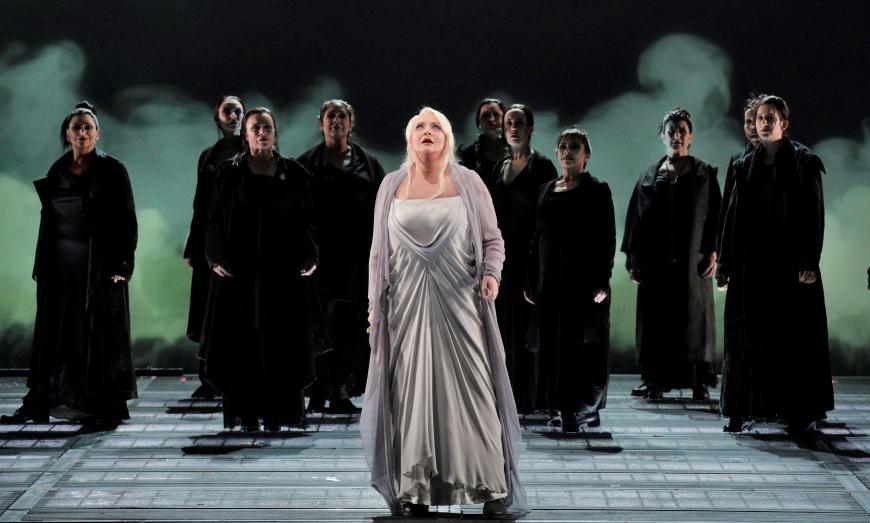
Singer cancellations are an ever-present risk for opera companies. Operas are scheduled and cast up to five years in advance and are often announced a year before they’re to be performed. A lot can go wrong between announcement and performance: singer retirements, vocal declines, illnesses, visa issues, the decision to drop a role, and more. A cancellation presents headaches for a company but also opportunities, when a singer who can save the day steps forward or the company can vault an unknown to stardom.
In early December 1941, the Metropolitan Opera’s schedule included a pair of performances of Wagner’s Die Walküre. Lotte Lehmann, singing Sieglinde, fell ill and had to cancel her appearance on Dec. 6. A few days later, Helen Traubel followed suit and withdrew from singing Brünnhilde.
Astrid Varnay, a 23-year-old soprano who had never appeared onstage, stepped in for both, with little notice, an improbable debut (and a double role debut) that launched a now-legendary 55-year career.
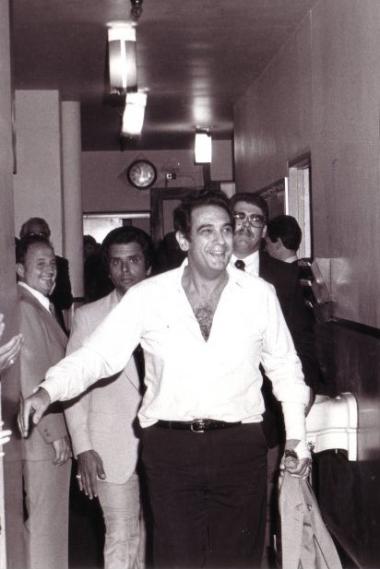
San Francisco Opera has had its share of dramatic cancellations. Most famously, tenor Carlo Cossutta became indisposed and canceled just hours before opening night in 1983, when he was scheduled to sing the demanding title role in Verdi’s Otello. General Manager Terence McEwan managed to contact Plácido Domingo, who was rehearsing at the Met in New York, and to secure him for opening night. An hour later, the tenor was on a private jet headed for San Francisco. A police escort got Domingo to the opera house in just 20 minutes, the curtain finally went up at 10:30 p.m., and the performance, before a crowd that might have been tipsier than usual, ended at 2 a.m.
That opening night wasn’t the last time that Otello caused problems for San Francisco. Ben Heppner’s withdrawal from the opera during the 2002–2003 season led to a parade of tenors in the role, with Jon Fredric West, Richard Decker, Antonio Barasorda, and Vladimir Galouzine doing the honors.
Heppner was also at the center of a Met run of Tristan und Isolde in March 2008 that was plagued by singer illness. The company’s original intent was to showcase the tenor and soprano Deborah Voigt in the title roles, but over the course of six performances, the pair appeared together only twice, with Heppner singing two performances and Voigt singing four and a half. (Janice Baird replaced Voigt in the middle of one performance and sang another in full.) Tenors John Mac Master and Robert Dean Smith sang one performance each, with Gary Lehman taking two.
Back to SF Opera (though not as dramatic as those Otello or Tristan performances): A happy surprise took place on Nov. 18, 1981, during a run of Aida, when Margaret Price, singing the title role, withdrew. There must have been sighs of disappointment when Kurt Herbert Adler appeared to announce the cast change, but surely there were cheers when he identified the substitute as the great Leontyne Price, who was in town for performances of Il trovatore. She agreed to step in for Margaret Price even though she hadn’t sung Aida for several years.
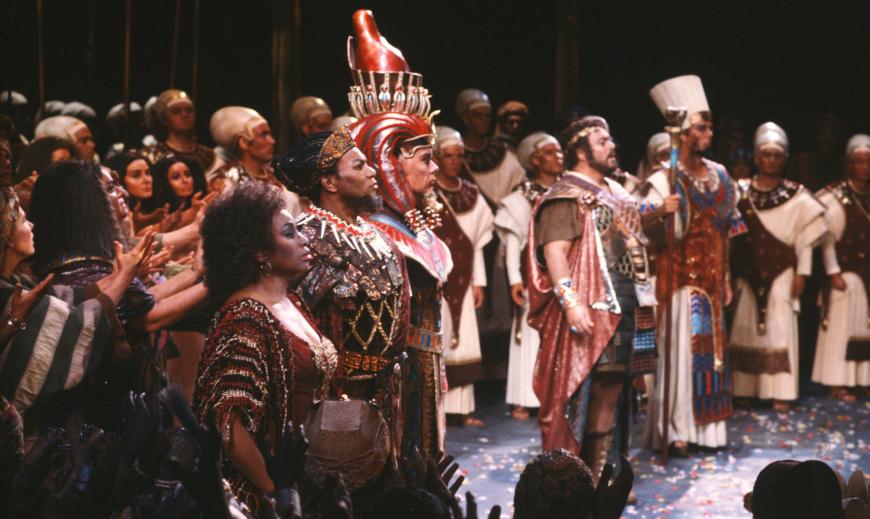
Singer cancellations were an issue for SF Opera during its first decade, when singers sometimes came to town just a day or two before their first scheduled appearances and travel was by train or boat, not jet. These started as early as the 1924 season, when Gaetano Merola, the founding general and music director of the company, had engaged the prominent Italian coloratura soprano Toti Dal Monte for what would be her American debut.
But Dal Monte extended an engagement in Australia and canceled her SFO appearances just two weeks before the start of the season. The planned opening-night opera, Lucia di Lammermoor, had to be replaced with Andrea Chénier, and Dal Monte’s remaining roles that year were assigned to sopranos Queena Mario and Thalia Sabanieva, plus the company devised a double bill to cover one of Dal Monte’s dates.
Like 1924, the 1926 season was thrown into disarray by the withdrawal of soprano Claire Dux, who had recently married and didn’t want to travel to California. Further, the arrival of the star soprano Claudia Muzio was delayed by a hurricane; Muzio had arrived late for the 1925 season as well. Florence Macbeth, who had little stage experience, took Dux’s roles. The planned opening night, Manon Lescaut, was postponed until Muzio’s arrival, with Tito Schipa and Macbeth leading Martha on opening night instead.
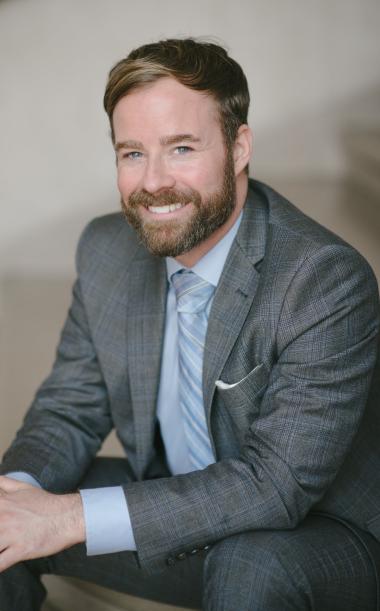
How does a modern opera company cope with the unknown? Gregory Henkel, managing director of the artistic department at SF Opera, is responsible for the company’s casting. “I am always working on backup plans,” he said, in response to questions via email. “And my backup plans have backup plans, as anyone can end up facing unexpected and insurmountable challenges that are outside of their control. I never consider my work done until the final note is sung at the final performance in the run. Cast changes can be necessary at any time in the process, even before the season is announced.”
The public never hears about such preannouncement cast changes, of course, but after an announcement is made, it’s a rare season without them. And they can come early: in 2017, the Met announced a cast change a mere two weeks after its announcement of the 2017–2018 season.
Henkel went on to describe how he prepares for these eventualities. “I start my process by brainstorming a running list of ideas while envisioning every project we produce. Casting is a collaborative process, so I like to be able to speak about multiple ideas all at once with my partners. I start with a wide net and narrow down my ideas while the project comes into greater focus. I keep that list going and add new levels of detail to it as time marches on. Even if casting is ‘finished’ for a particular project, I may return to those ideas down the line. Or maybe much further into the future if we plan to revive the title in a later season.
“Every situation is a little bit different based on the project and role. When a cast change is needed, there are many factors that have to be considered: timing of the change, the ensemble that’s already been established, artist availability.”
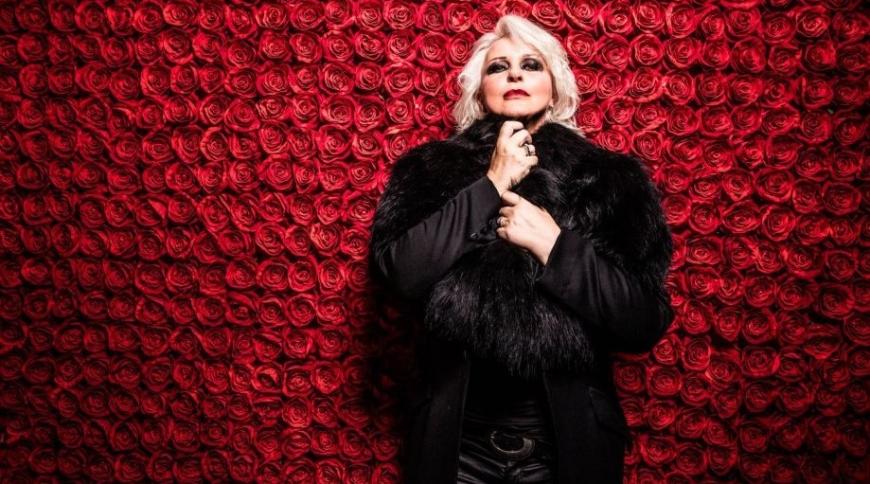
This careful planning has paid off for SFO on multiple occasions in the last decade. In 2018, Evelyn Herlitzius, the planned Brünnhilde for that year’s performances of Der Ring des Nibelungen, withdrew on a Monday. Only a handful of sopranos can sing the role, and at least two — Nina Stemme and Christine Goerke — were unavailable because they were singing elsewhere that June. Nonetheless, the company was able to announce Herlitzius’s withdrawal, and her replacement by Iréne Theorin, a mere two days later.
Two other important singer cancellations involved world premieres. The title role of Tobias Picker’s Dolores Claiborne, presented during the 2013–2014 season, was written for mezzo-soprano Dolora Zajick. She withdrew from the opera about three weeks before the premiere, citing the physical and vocal demands of the role at a time when she was having difficulties with her knees. Patricia Racette, who took over the lead, was already in San Francisco, where she was scheduled to appear in Arrigo Boito’s Mefistofele. The soprano knew Picker’s style well because she had previously sung in the premieres of his operas An American Tragedy and Emmeline, making her a natural choice for Dolores.

This year, the happy event of Julia Bullock’s pregnancy necessitated her withdrawal from the premiere of John Adams’s Antony and Cleopatra, which will open SFO’s centennial season. Bullock has become a prominent performer of Adams’s operas, with the composer calling her his muse. The part of Cleopatra was written with her in mind, and Bullock’s withdrawal was announced in late May, just two months before the start of rehearsals.
I asked Henkel what factors came into play for him in casting soprano Amina Edris as Cleopatra. He cited her great skill in delivering text (“very important in Shakespeare”), her distinctive timbre over a wide vocal range, an engaging and commanding presence even on the very large War Memorial Opera House stage, and her musical excellence.
He also noted that Edris had a great success here, before the pandemic, in Roméo et Juliette, with very little rehearsal. Adams’s music isn’t easy, and Henkel “trusted that she could prepare the role in the time available, and she was up for the challenge.” And because the soprano had been an Adler Fellow with the company, both General Director Matthew Shilvock and Antony director Elkhanah Pulitzer knew her and her work.
Said Henkel, “I can’t deny that it also felt magically serendipitous that San Francisco Opera had recently featured her in an episode of our In Song series that celebrated her Egyptian heritage and her journey to becoming an opera singer, but that seemed more like a cherry on top compared to everything else that is so special about Amina.”



